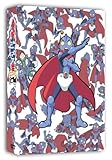The Art of Computer Programming 一巻、今のうちに買っておくかねえ。
四巻も欲しいところだけど…分冊全部揃えるのは財布に厳しいな。
達人プログラマーを読もうってのはいいことだと思いますが、
達人プログラマー読書会@札幌-2011.08.01 : ATND
「達人プログラマー システム開発の職人から名匠への道」 の読み合わせを行います。
この「読み合わせ」の使い方間違ってんじゃないかなあ。
読み合わせ - 国語辞書 - goo辞書
「current」といっても1984年のことですが
A review of current popular programming languages: COBOL, Pascal, Forth, Logo, and BASIC. : programming
経由で
Programming : Free Download & Streaming : Internet Archive
A review of current popular programming languages.
Guests: Gary Kildall, DRI; Paul Grady, Microfocus; Dave Eisenberg, Apple; Elizabeth Rather, Forth
Products/Demos: COBOLFORTHFORTH Graphics, PASCAL, Apple's Personal COBOL
This movie is part of the collection: Computer Chronicles
Keywords: Episode year: 1984
おお、ゲーリー・キルドールの名前が。
キルドールと言えば彼が出演した回の新・電子立国を観たいなあ
reddit での反応から抜粋(元記事には面白いやりとりまだあるよ :)。
A review of current popular programming languages: COBOL, Pascal, Forth, Logo, and BASIC. : programming
A review of current popular programming languages: COBOL, Pascal, Forth, Logo, and BASIC. (archive.org)
It's amazing that they never mention C. The language pre-dates all of these (except
BASIC) and is still in use today yet it doesn't even enter into their discussion.
Yes, I know COBOL is still around in some legacy applications, but nothing new is ever
written in it.
It's amazing that they never mention C. The language pre-dates all of these (except BASIC)
Except BASIC (64), and COBOL (59) and FORTH (70) and Pascal (68) and Logo (67).
All of the languages predate C (72).
I stand corrected. Still C was largely contemporaneous with the latter three, since
development on it started in the late 60s. I was more making the point that this
program was produced in 1984, long after C had established its dominance as a general
purpose language, rather than being explicitly factual.
In 1984, C had only achieved dominance in the UNIX sphere. At that time, C compilers
were big, slow, and expensive. It was just another language on microcomputers, it's
popularity among minicomputers was decidely hit-and-miss, and practically nonexistent
on mainframes. The workstations was the platform C most dominated.
There were far more development jobs available using COBOL than C in 1984.
That may have turned around by 1994.
Upvoted for "contemporaneous".
They did mention C, when they talked about systems programming languages briefly.
AFAICT this video was about applications programming languages, so C didn't come up.
1984 年だと Turbo-C はまだなのか。んじゃあ DOS ではまだあまり使われてなかったっぽい。
Borland Turbo C - Wikipedia, the free encyclopedia
Version history
Turbo C 1.0
* Version 1.0, on May 13, 1987 - It offered the first integrated edit-compile-run
development environment for C on IBM PCs. The software was, like many Borland
products of the time, bought from another company and branded with the "Turbo"
name, in this case Wizard C by Bob Jervis[1][2] (The flagship Borland product at
that time, Turbo Pascal, which at this time did not have pull-down menus, would
be given a facelift with version 4 released late in 1987 to make it look more
like Turbo C.) It ran in 384 kB of memory. It allowed inline assembly with full
access to C symbolic names and structures, supported all memory models, and
offered optimizations for speed, size, constant folding, and jump elimination.[3]
MS-C は 3.0あたり?
Visual C++ - Wikipedia, the free encyclopedia
16-bit versions
* Microsoft C 1.0, based on Lattice C, was Microsoft's first C product in 1983. It was
not K&R C.
* C 2.0 added large model support.
* C 3.0 was the first version developed inside Microsoft. It was extremely compatible
with K&R and the later ANSI standard. It was being used inside Microsoft (for
Windows and Xenix development) in early 1984. It shipped as a product in 1985.
* C 4.0 added optimizations and CodeView, a source level debugger.
RubyKaigi 2011 個人的お気に入りセッション : 僕は発展途上技術者
まつもとさんにも twitter 経由で指摘されてましたが、かずひこさんのことをすっかり忘れておりました。
母語がフランス語という人をイメージしていたのが敗因でした。
[Ruby] 最後のRubyKaigiのメモランダム / Quelques notes sur le dernier RubyKaigi - ふぇみにん日記(2011-07-20)
すでにTweetしたのも含めて、思いつくままに。
このへんとかこのへんとかでつっこまれていますが、クロージングでサブスクリーンの上部に
「またお会いしましょう」「See you again」と並んで、フランス語で「Au revoir」と出ていた
のは私のせいです。何かメッセージを出したいと(たぶん)june29が提案して、じゃあ「またお
会いしましょう」と「See you again」はどう?って私が提案して、ついでにフランス語だと
「Au revoir」だよと言ったらそれが採用されてしまったと。
この流れにはとても納得しました。
まあ来場者皆の母語でってのは無理な相談ですよね。
それでもポルトガル語あたりは欲しかったかなという気も。




![かってに改蔵 中巻(期間限定版) [Blu-ray]](http://ecx.images-amazon.com/images/I/51QUtAzxiPL._SL160_.jpg)







